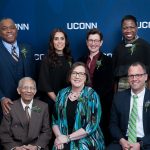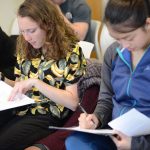“A trauma-informed approach is critical for schools,” says Sandra Chafouleas, a professor of educational psychology at University of Connecticut who has researched the topic. She says the new push helps school staffs identify and provide counseling for the estimated one-half to two-thirds of students who, according to the Education Law Center, probably have experienced trauma.
Suzanne M. Wilson has researched teacher knowledge, curriculum reform, education policy, measures of
teaching effectiveness and professional development. As the Neag Endowed Professor of Teacher Education, Wilson has found PD to be most impactful and engaging when instruction connects to a district’s curriculum, assessments and leadership policies.
A Kaplan Test Prep survey finds that 76 percent of future college students are more interested in topics regarding politics, human rights, and activism than they were two years ago. Such data is no surprise given the current heightened political atmosphere, said University of Connecticut professor in human rights Glenn Mitoma.
On March 20, 2018, U.S. News released their rankings for best public graduate schools of education for 2019, placing UConn’s Neag School at number 17. This ranking is not exactly unexpected, as Neag has consistently placed within the top 20 schools for the past three years.
According to research over the years, gifted identification is closely tied to income and race. Students from low-income families and students who are black or Latino are much less likely to be identified as gifted than more-affluent students and white or Asian students. “The key factor is poverty, to be honest,” said Del Siegle, a University of Connecticut professor in gifted education and director of the National Center for Research on Gifted Education. The groups that are likewise underrepresented in schools’ gifted programs — minorities and English language learners — often share the issues of poverty.
In addition, according to a study by Joshua Hyman, an assistant professor at the University of Connecticut, the test also uncovered low-income students who might have otherwise not applied to college: about 480 for every 1,000 who had taken the test before 2007 and had scored well.
This past Saint Patrick’s Day, members of the Neag School of Education Alumni Board; Neag School faculty, staff, and administrators; friends of the University; and families gathered around tables draped in purple in the Rome Ballroom of the University of Connecticut’s Storrs campus to celebrate the achievements of seven Neag School alumni during the 20th annual Neag School of Education Alumni Awards Celebration.
A former UConn student-athlete, Clewiston Challenger ’03 (CLAS), ’08 MA now serves as assistant professor of counseling in the Neag School. This latest installment of “10 Questions” connects with Challenger on his experiences as a UConn undergrad, his current research, and his aspirations for the students he now teaches in the counseling program.
The Neag School of Education, the UConn Department of English, and the Connecticut Writing Project (CWP) at UConn are proud to announce Connecticut’s winners of the 25th annual Letters About Literature competition, a nationwide contest sponsored by the Library of Congress for students in grades 4 through 12.
“Teacher preparedness has been the focus of a great deal of (at times) impassioned debate in the last thirty years,” says Dr. Suzanne Wilson, Neag Endowed Professor of Teacher Education at the University of Connecticut and Chair of Curriculum and Instruction in the Neag School. “The teacher workforce is the largest profession in the U.S.; preparing close to four million teachers to be high quality is challenging.”



